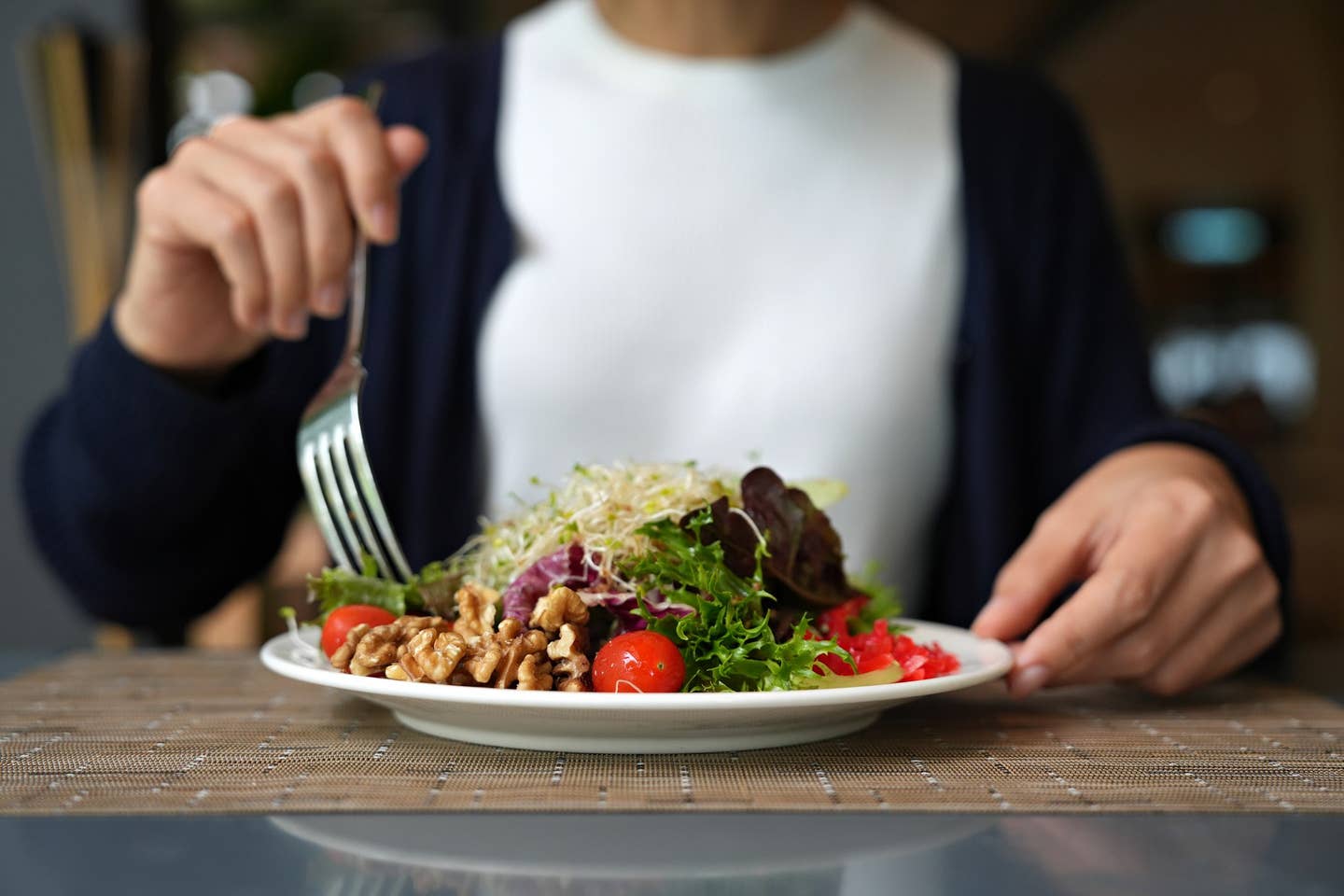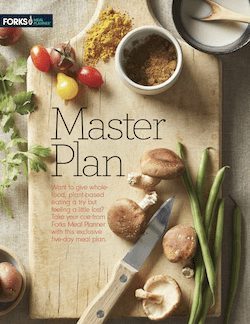Now that you have been inspired by Forks Over Knives and adopted a whole-food, plant-based diet as your foundation for health, perhaps you are ready to pursue meaningful fitness goals but don’t know where to start. Or perhaps you have been working out for a long time and are concerned that your new diet will affect your performance. As a twenty-year plant-based athlete, I’ve sorted through all of the issues unique to vegan athletes and guided thousands to successfully incorporate physical activity into their vegan lifestyle routine. Here are some of my top tips:
1. Unlearn the Most Common Nutrition Myth
A common question that comes up among many people new to a plant-based diet is, “what do I eat?” What to avoid on a plant-based it quite clear: all animal products. If we want that plant-based diet to be a healthy one, we take things a step farther, also eliminating processed foods, including oils and refined carbohydrates. But knowing only what not to eat leaves many wondering how to get adequate nutrition, especially protein.
The human requirement for protein is so low (5 to 10 percent of our total caloric intake) that as long as you consume adequate calories to maintain your weight, it is virtually impossible to have a protein deficiency. Further, if you are eating nothing but a variety of whole, natural plants, you will get enough of every single essential amino acid, regardless of which foods you choose (the complete protein myth has long been debunked). You would experience a calorie deficiency before a protein deficiency, and both are virtually nonexistent in first-world societies.
(RELATED: The No-B.S. Guide to Vegan Protein)
2. Know Which Foods Best Fuel Your Fitness
Nobody is fueled by kale, so don’t fool yourself into thinking you will get sufficient energy to perform athletic activities from leafy greens and other nonstarchy vegetables (which average about 100 and 150 calories per pound, respectively). For long-lasting fuel, vegan athletes and nonathletes alike need to center their diets around the more calorically dense whole plant foods that are rich in complex carbohydrates such as potatoes, beans, lentils, squash, brown rice, oats, quinoa, and other starchy vegetables, legumes, and grains (which range from about 350 to 600 calories per pound). Fruits (which average about 250 calories per pound) are also an excellent source of fuel. This is especially true right before exercise, because they digest quickly and will not weigh heavily in your stomach during cardiovascular exercise. When you consume an abundance of whole, unprocessed plant foods, you get not only get the fuel, but also the full range of macronutrients (protein, fat, carbohydrates, water, and fiber) and micronutrients (vitamins, minerals, enzymes, antioxidants, and other important phytochemicals).
Since most whole plant foods contain 600 or fewer calories per pound (with the exception of nuts and seeds, which range from 2,500 to 3,000 calories per pound, on average), you can eat a lot of food, experiencing many flavors and textures, and the volume will fill you up before you overdose on calories. Overeating is easy to do when consuming refined and processed foods. By consuming foods high in nutrients and low in calorie density, you can support energy production and muscle recovery without excess fat gain, while avoiding the energy-sucking process of digesting refined foods.
(RELATED: How to Build Muscle on a Plant-Based Diet)
3. Eat Many Small Meals Per Day
When it comes to what to eat, know that your options are boundless, with ample varieties of fruits, vegetables, legumes, grains, nuts, and seeds. Because whole plant foods are lower in calorie density (see #2), you may find that you need to eat more volume than you did before. Simply choose the foods you like the most and eat 5 or 6 small meals throughout the day until you are comfortably full. This way, you’ll find it easier not to under- or overeat. You will have sufficient fuel to work out any time, rather than finding yourself too hungry, too full, or too tired to exercise, as is common when we eat three more substantial meals each day. The two biggest obstacles that keep people from exercising regularly are shortages of time and energy. You can now put the energy issue to rest and work on time management to ensure that regular exercise is part of your routine.
If you aren't losing or gaining weight as you'd like, then it's a good idea to get a general sense of how many calories you need to eat in a day. To determine your own personal caloric needs, simply use an online Harris-Benedict calculator, and enter five simple bits of data. This will reveal two numbers: (1) your estimated BMR (basal metabolic rate), the average number of calories you would burn if you slept all day and (2) your daily calorie needs, taking into account your activity level.
4. Get Moving … and Have Fun!
Over the years, one thing I have discovered to be profoundly true is that if it isn’t fun, I am unlikely to do it regularly. This clearly applies to fitness. If your current exercise routine is not enjoyable, you will find yourself consciously or unconsciously avoiding exercise by finding other ways to occupy your time, such as putting in extra hours at work or distracting yourself with entertainment or hobbies. This approach will not lead to fitness success. To succeed, you will need to find genuine enjoyment in whatever activity you choose. Exercise is not just putting on spandex and grunting while lifting weights. Exercise is hiking, swimming, jogging, playing team sports, and anything else that increases your heart rate, gets your body moving vigorously, and puts stress on your muscles. Find a physical activity you enjoy, and do it regularly. I suggest exercising for 30 to 90 minutes a day, three to five days per week, which allows at least a couple of days off for recovery.
Ready to get started? Check out Forks Meal Planner, FOK’s easy weekly meal-planning tool to keep you on a healthy plant-based path. To learn more about a whole-food, plant-based diet, visit our Plant-Based Primer.
Related News
Try Our Top-RatedMeal Planner Free

Forks Meal Planner takes the hard work out of making nutritious meals the whole family will enjoy.
SAVE $200 ON OUR ULTIMATE COURSE

Join our best-selling course at a new lower price!





